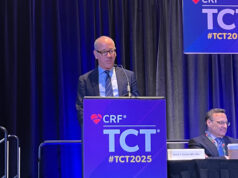 Inquis Medical recently announced results from its AVENTUS trial evaluating the safety and efficacy of the company’s Aventus thrombectomy system.
Inquis Medical recently announced results from its AVENTUS trial evaluating the safety and efficacy of the company’s Aventus thrombectomy system.
The results were presented by Jun Li (University Hospitals Harrington Heart & Vascular Institute, Cleveland, USA), the trial’s national co-principal investigator, at the 2025 Society of Cardiovascular Angiography and Interventions (SCAI) Scientific Sessions (1–3 May, Washington, DC, USA). The results were simultaneously published in the society’s peer-reviewed journal, JSCAI.
A press release notes that the AVENTUS trial successfully met its primary endpoints, demonstrating both safety and efficacy in the treatment of acute intermediate-risk pulmonary embolism (PE) patients. Results showed significant improvement in right ventricular (RV) function, reduction in clot burden, minimal blood loss, and short intensive care unit (ICU) and total hospital stays with no device-related major adverse events. The trial also reported meaningful improvements in patient-reported quality of life and a significant increase in six-minute walk test (6MWT) distance through 30 days.
“There remains a clear need for next-generation technologies that can address some of the limitations of current PE devices,” said Li. “The AVENTUS trial confirms that this system not only performs safely and effectively, but also supports meaningful improvements in clinical efficiency and outcomes, marking an important advancement in PE care.”
The AVENTUS trial is a prospective, single-arm, multicentre investigational device exemption (IDE) trial that enrolled a total of 130 patients with acute intermediate-risk PE across 22 sites in the USA with 49 unique investigators. Patients aged 18–80 years of age with symptomatic computed tomography angiography (CTA)-documented acute intermediate-risk PE of ≤14 days duration were eligible for enrolment. Intermediate-risk PE was defined as RV/left ventricular (LV) ratio ≥0.9 per international guidelines.
“The Aventus system appears to offer a new option in the treatment of PE based on the trial’s safety and efficacy data,” said Saher Sabri (Georgetown University School of Medicine, Washington, DC, USA), national co-principal investigator of the AVENTUS trial and lead author on the JSCAI publication. “The trial included 49 unique users across 22 sites, and looks to deliver consistent outcomes including minimal blood loss and no device-related major adverse events. Improvement in functional outcomes at 30 days was also demonstrated across the study cohort.”










